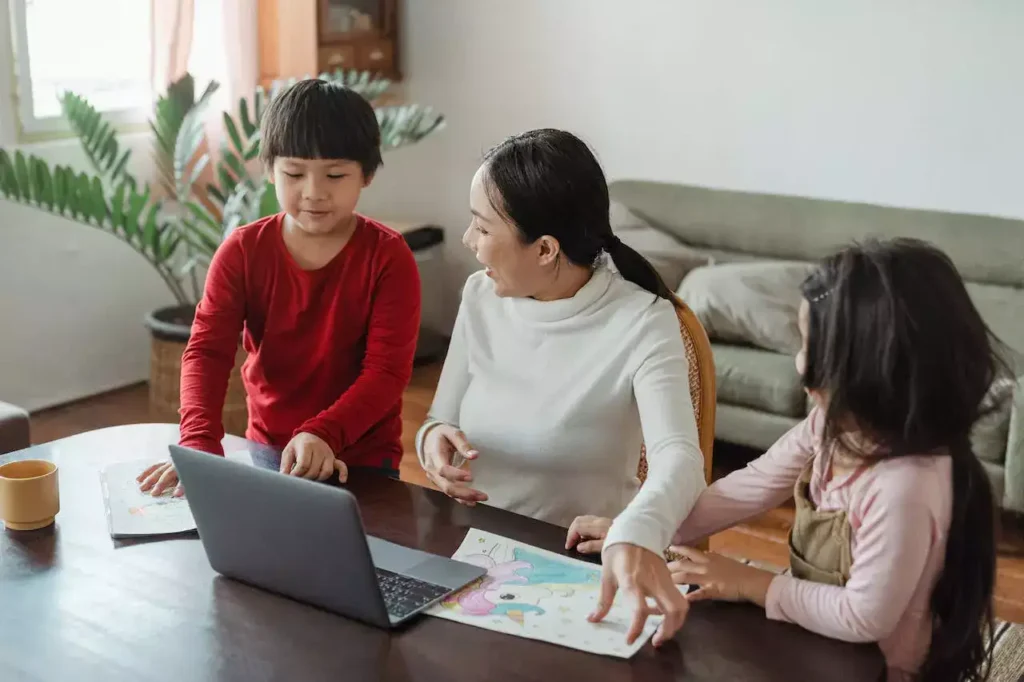|
Getting your Trinity Audio player ready... |
How do communicate with a child?

Communicating with a child is a delicate art that requires patience, empathy, and active listening. To effectively communicate with a child, consider the following strategies:
- Active Listening: Pay close attention to what the child is saying. Show genuine interest by maintaining eye contact and nodding to indicate understanding[5].
- Use Simple Language: Children may not understand complex vocabulary. Use simple and clear language to convey your message effectively.
- Be Empathetic: Understand the child’s emotions and respond with empathy. Acknowledge their feelings and validate their experiences.
- Be Patient: Children might take time to express themselves. Be patient and give them the time they need to formulate their thoughts.
- Ask Open-Ended Questions: Encourage conversation by asking open-ended questions that require more than just a yes or no answer. This promotes dialogue[5].
- Use Non-Verbal Communication: Facial expressions, gestures, and body language can convey a lot to a child. Be mindful of your non-verbal cues.
- Be Respectful: Treat the child with respect, acknowledging their opinions and ideas even if they differ from yours.
- Be Supportive: Create a safe environment where the child feels comfortable sharing their thoughts and concerns.
- Be Mindful of Tone: The tone of your voice can greatly impact how your message is received. Use a calm and friendly tone to foster trust and openness.
- Encourage Creativity: Engage in creative activities like drawing or storytelling. These activities can help children express themselves in unique ways.
Remember, effective communication with a child involves not only speaking but also listening and understanding their perspective. By employing these strategies, you can build a strong and positive relationship with the child, fostering trust and mutual understanding.
🌐 Sources
How to communicate with 2 year old?
Communicating with a 2-year-old requires specific techniques tailored to their developmental stage. Here’s how to effectively communicate with a 2-year-old:
- Use Simple Language: Speak in short, simple sentences using clear and easy-to-understand words. Avoid using complex language that might confuse them[5].
- Be Expressive: Use facial expressions and gestures to convey emotions and intentions. Non-verbal cues can enhance understanding.
- Active Listening: Pay attention to their babbling and attempts at speech. Respond to their sounds, which encourages them to communicate more[5].
- Repeat and Reinforce: Repeat words and phrases to reinforce their learning. Repetition helps them grasp language better.
- Ask Simple Questions: Ask questions that require basic responses like yes or no. This encourages them to participate in the conversation.
- Use Play: Engage in interactive play using toys. Play is a natural way for children to communicate and express themselves.
- Be Patient and Encouraging: Children at this age are still learning to communicate. Be patient when they struggle to express themselves and praise their efforts.
- Establish Routine: Create a consistent daily routine. Predictable schedules help them understand and anticipate events, aiding communication.
- Use Positive Reinforcement: Encourage communication by praising their attempts. Positive reinforcement boosts their confidence[5].
- Be Attentive: Observe their body language and emotions. Understanding their feelings helps you respond appropriately.
By employing these techniques, you can create a supportive environment that fosters effective communication with a 2-year-old, laying the foundation for their language development and strengthening your bond.
🌐 Sources
How do communicate with your teacher?
Effective communication with your teacher is crucial for a successful learning experience. Here are key strategies to communicate with your teacher respectfully and effectively:
- Active Listening: Pay attention when your teacher speaks. Active listening shows respect and helps you understand the instructions clearly[5].
- Ask Questions: Don’t hesitate to ask questions if something is unclear. Teachers appreciate students who seek clarification, fostering a supportive learning environment.
- Be Respectful: Use polite language and maintain a respectful tone. Treat your teacher with courtesy, acknowledging their expertise and authority in the classroom.
- Participate Actively: Engage in class discussions, answer questions, and contribute to the learning environment. Active participation demonstrates your interest and enthusiasm for the subject matter.
- Use Email Professionally: When communicating via email, be concise, clear, and professional. Use proper salutations and signatures, addressing the teacher appropriately.
- Be Punctual: Arrive on time for classes and meetings. Punctuality shows your commitment to the learning process and respect the teacher’s time[5].
- Respect Classroom Norms: Follow classroom rules and guidelines. Respect the established norms, ensuring a conducive learning atmosphere for everyone.
- Express Gratitude: A simple thank-you can go a long way. Express appreciation for the teacher’s efforts, acknowledging their dedication to your education.
- Address Concerns Professionally: If you have concerns, address them professionally and privately. Respectfully discuss any issues, seeking resolution amicably.
- Reflect and Apply Feedback: Take feedback constructively. Reflect on the feedback provided by your teacher and apply it to enhance your learning and performance.
By adhering to these principles, you not only enhance your learning experience but also foster a positive and respectful relationship with your teacher, creating an environment conducive to effective education.
🌐 Sources
How do communicate better with a child?
Improving communication with a child requires a blend of patience, empathy, and active engagement. Here are key strategies to communicate better with a child:
- Active Listening: Pay close attention to the child’s words and emotions. Actively listening demonstrates your genuine interest in what they are saying and feeling[5].
- Use Simple Language: Speak in a clear and straightforward manner. Use words and phrases that match the child’s age and comprehension level, avoiding jargon or complex vocabulary.
- Be Empathetic: Understand the child’s perspective. Empathizing with their emotions helps you respond appropriately and connect on an emotional level.
- Encourage Expression: Create a safe space for the child to express themselves. Encourage them to share their thoughts, feelings, and concerns openly.
- Be Patient: Children might take time to formulate their thoughts. Be patient, giving them the time they need to express themselves without pressure.
- Ask Open-Ended Questions: Encourage conversation by asking questions that require more than a yes or no answer. Open-ended questions promote dialogue and expand their communication skills[5].
- Use Play and Creative Activities: Engage in play and creative activities. Play is a natural way for children to communicate. Engaging in activities like drawing or storytelling can facilitate communication.
- Set a Positive Example: Demonstrate respectful communication through your actions. Children learn by observing, so modeling positive communication behavior is crucial.
- Be Supportive: Offer praise and encouragement for their efforts to communicate. Positive reinforcement boosts their confidence and motivates them to communicate more.
- Respect Their Boundaries: Understand when the child needs space. Respect their boundaries, ensuring they feel secure and comfortable during interactions.
By incorporating these strategies, you establish a foundation of trust and understanding, fostering a healthy and effective communication channel with the child.
🌐 Sources
How do communicate effectively with an autistic child?
Communicating effectively with an autistic child requires patience, understanding, and tailored approaches. Here are essential strategies to foster effective communication:
- Be Patient and Calm: Autism can affect communication skills differently. Stay patient, giving them time to process and respond.
- Use Clear and Simple Language: Speak in short, straightforward sentences. Avoid ambiguity, making it easier for the child to comprehend.
- Visual Aids: Use visual aids like pictures, charts, or drawings to supplement verbal communication. Visual cues enhance understanding.
- Understand Sensory Sensitivities: Many autistic children have sensory sensitivities. Be aware of their preferences and discomforts, and adapt to the environment accordingly.
- Engage Their Interests: Incorporate their interests into conversations. Discussing topics they love can capture their attention and facilitate communication.
- Use Social Stories: Social stories help explain social situations and expectations. Use these stories to prepare them for new experiences or routines.
- Practice Predictability: Maintain consistent routines. Predictability provides a sense of security, making communication more comfortable for the child.
- Non-Verbal Communication: Pay attention to their non-verbal cues like gestures or facial expressions. Non-verbal signals often convey their emotions and needs.
- Encourage Expressive Outlets: Some autistic children find it easier to express themselves through art, music, or writing. Encourage these outlets for self-expression.
- Develop Trust and Rapport: Build trust by being consistent, understanding, and supportive. A strong bond encourages them to communicate more openly.
- Be Mindful of Sensory Overload: Loud noises or bright lights can overwhelm autistic children. Be mindful of their sensory experiences to create a comfortable environment for communication.
- Seek Professional Support: Consult speech therapists or autism specialists. They can provide tailored strategies and techniques based on the child’s specific needs.
By implementing these approaches, you can create a supportive and understanding environment, enabling effective communication with autistic children and fostering meaningful connections.
🌐 Sources
How do communicate better with my child?
Improving communication with your child is crucial for building a strong bond. Here are effective strategies to enhance your communication skills:
- Active Listening: Pay close attention when your child speaks. Show genuine interest by maintaining eye contact and nodding, indicating that you value their words.
- Encourage Openness: Create a safe environment where your child feels comfortable sharing their thoughts and feelings without fear of judgment.
- Be Patient: Children might take time to express themselves. Be patient and avoid interrupting, allowing them to finish their thoughts.
- Use Positive Reinforcement: Praise your child for their efforts in expressing themselves. Positive reinforcement boosts confidence and encourages more communication.
- Ask Open-ended Questions: Instead of questions that can be answered with a simple yes or no, ask open-ended questions that require thoughtful responses, promoting meaningful conversations.
- Empathize: Put yourself in your child’s shoes. Understanding their perspective helps in addressing their concerns more effectively.
- Be Clear and Concise: Use simple language that your child can easily understand. Be clear in your communication to avoid confusion.
- Respect Their Opinions: Even if you disagree, respect your child’s opinions. Acknowledging their viewpoint validates their feelings and encourages open dialogue.
- Quality Time: Spend quality time with your child. Engaging in activities together provides natural opportunities for communication.
- Lead by Example: Demonstrate good communication skills in your interactions with others. Children learn from observing parental behavior.
- Non-Verbal Communication: Pay attention to your body language and facial expressions. Non-verbal cues often convey emotions more strongly than words.
- Be Supportive: Celebrate their achievements, no matter how small. Your encouragement boosts their confidence and willingness to communicate.
By incorporating these techniques into your interactions, you can foster a healthy and open line of communication with your child, strengthening your relationship and mutual understanding.
🌐 Sources
How do communicate better with an autistic child?
Improving communication with an autistic child requires patience, understanding, and tailored strategies. Here are effective ways to enhance communication with autistic children:
- Visual Communication: Use visual aids like pictures, charts, or social stories to help convey information. Visual cues can be powerful tools for communication.
- Structured Routine: Establish a predictable routine. Autistic children often feel more secure and responsive when they know what to expect.
- Clear and Concise Language: Use simple and clear language. Avoid idiomatic expressions and sarcasm, as autistic children may have difficulty understanding them.
- Use Their Interests: Incorporate their special interests into conversations. Discussing topics they are passionate about can encourage engagement.
- Be Patient and Give Time: Allow extra time for them to process information and respond. Avoid rushing or interrupting their communication attempts.
- Social Stories: Create social stories that illustrate common social situations. This helps them understand social cues and appropriate responses.
- Non-Verbal Communication: Pay attention to their body language and non-verbal cues. They might communicate through gestures or facial expressions.
- Sensory Sensitivities: Be mindful of sensory sensitivities. Some autistic children may be sensitive to light, sound, or touch, affecting their communication.
- Use Positive Reinforcement: Praise their communication attempts, reinforcing their efforts to express themselves, even if it’s non-verbal.
- Develop Trust: Build a trusting relationship. When they feel safe and valued, they are more likely to engage in communication.
- Applied Behavior Analysis (ABA): ABA therapy can provide structured techniques to improve communication skills in autistic children.
- Speech and Language Therapy: Seek the guidance of speech-language therapists who specialize in working with autistic children. They can offer personalized strategies.
By incorporating these techniques and understanding the unique needs of each child, caregivers and educators can create a supportive environment that fosters effective communication with autistic children.
🌐 Sources
- Autism Speaks – Communication Strategies
- Autism Parenting Magazine – Effective Communication
- American Speech-Language-Hearing Association – Autism
How do connect better with your child?
Connecting better with your child involves fostering a strong emotional bond through effective communication and understanding. Here are essential ways to strengthen your connection:
- Active Listening: Give your child your full attention when they speak. Validate their feelings, showing that you value their thoughts and emotions.
- Quality Time: Spend quality time together regularly. Engage in activities your child enjoys, fostering positive experiences and memories.
- Empathy: Put yourself in your child’s shoes to understand their perspective. Empathy builds trust and emotional connection.
- Open Communication: Encourage open dialogue. Create a safe space where your child feels comfortable discussing their thoughts and concerns.
- Be Present: Be present both physically and mentally. Put away distractions like phones and be fully engaged during interactions.
- Positive Reinforcement: Praise their achievements and efforts. Positive reinforcement boosts their confidence and strengthens the parent-child bond.
- Respect Boundaries: Respect their personal space and boundaries. Teaching respect fosters a healthy connection.
- Lead by Example: Demonstrate the values and behaviors you wish to instill in your child. They learn from observing your actions.
- Quality Conversations: Engage in meaningful conversations. Ask open-ended questions, encouraging them to express themselves fully.
- Express Love: Show your love and affection regularly. Hugs, kisses, and verbal affirmations create a warm, loving environment.
- Encourage Independence: Allow them to make age-appropriate decisions. Encouraging independence builds their confidence and self-esteem.
- Be Patient: Understand that building a strong connection takes time. Be patient, allowing the relationship to develop naturally.
Remember, every child is unique, so tailor your approach based on their personality and interests. By investing time, patience, and genuine effort, you can create a deep, lasting connection with your child, fostering a loving and supportive relationship.
🌐 Sources
- Psychology Today – Building a Secure Attachment Bond with Your Baby
- Child Mind Institute – How to Connect with Your Kids
- Parents – How to Connect with Your Kids: 10 Practical Tips
What are some quotes about Communication for children?
Certainly! Understanding the importance of effective communication in childhood, here are some insightful quotes about communication for children that emphasize the significance of this skill:
“To effectively communicate, we must realize that we are all different in the way we perceive the world and use this understanding as a guide to our communication with others.”
-Tony Robbins
“Children have real understanding only of that which they invent themselves, and each time that we try to teach them too quickly, we keep them from reinventing it themselves.”
-Jean Piaget
“The way we talk to our children becomes their inner voice.”
– Peggy O’Mara
“Good communication is as stimulating as black coffee, and just as hard to sleep after.”
– Anne Morrow Lindbergh
“Children are not things to be molded, but are people to be unfolded.”
– Jess Lair
“Your children need your presence more than your presents.”
– Jesse Jackson
“The most important thing in communication is hearing what isn’t said.”
– Peter Drucker
“The art of communication is the language of leadership.”
– James Humes
“Children are great imitators, so give them something great to imitate.”
– Anonymous
“Effective communication is 20% what you know and 80% how you feel about what you know.”
– Jim Rohn
“Speak in such a way that others love to listen to you. Listen in such a way that others love to speak to you.”
– Anonymous
“The most important thing in communication is to hear what isn’t being said.”
– Peter Drucker
“Children must be taught how to think, not what to think.”
– Margaret Mead
“The best way to predict your child’s future is to create it.”
– Abraham Lincoln
“Every child deserves a champion; an adult who will never give up on them, who understands the power of connection and insists that they become the best they can possibly be.”
– Rita Pierson
“Your words will either give you joy or give you sorrow, but if they were spoken without regret, they give you peace.”
– Shannon Alder
“Children are like wet cement. Whatever falls on them makes an impression.”
– Haim Ginott
“The single biggest problem in communication is the illusion that it has taken place.”
– George Bernard Shaw
“A person’s a person, no matter how small.”
– Dr. Seuss
“The way we communicate with others and with ourselves ultimately determines the quality of our lives.”
– Tony Robbins
“If you want your children to be intelligent, read them fairy tales. If you want them to be more intelligent, read them more fairy tales.”
– Albert Einstein
“Children are not things to be molded, but are people to be unfolded.”
– Jess Lair
“The best way to make children good is to make them happy.”
– Oscar Wilde
“It’s not what you say to your children, but how you say it. Words that uplift, inspire, and encourage can have a lasting positive effect on a child’s life.”
– Zig Ziglar
“Children are great imitators, so give them something great to imitate.”
– Anonymous
These quotes emphasize the significance of nurturing positive communication with children, recognizing them as unique individuals, and promoting a supportive, encouraging environment for their growth and development.
🌐 Sources
- Tony Robbins Quotes
- Jean Piaget Quotes
- Peggy O’Mara Quotes
- Anne Morrow Lindbergh Quotes
- Jess Lair Quotes
- Jesse Jackson Quotes
- Peter Drucker Quotes
- James Humes Quotes
- Jim Rohn Quotes
- Margaret Mead Quotes
- Rita Pierson Quotes
- Shannon Alder Quotes
- Haim Ginott Quotes
- George Bernard Shaw Quotes
- Dr. Seuss Quotes
- Tony Robbins Quotes
- Albert Einstein Quotes
- Jess Lair Quotes
- Oscar Wilde Quotes
- Zig Ziglar Quotes
This post is for informational purposes only.Invest responsibly.No guarantees of results. Seek professional guidance before investing.Consult experts for personalized advice. Please note that I am not a SEBI registered investment advisor. The information provided in this article is for informational and educational purposes only and should not be construed as financial advice. Always consult with a qualified and SEBI registered financial professional before making any investment decisions.Follows Google policies.Not affiliated with Investopedia.com. investopedia.co.in Independent site.









